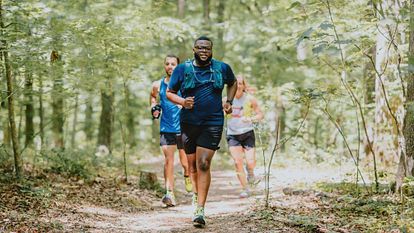
6 Surprising Benefits of Trail Running
We all need an escape from everyday stressors. Any type of running relieves stress, but trail running takes it to the next level. Get your endorphins without the extra carbon monoxide, noise, and busy intersections. With softer surfaces, a variety of terrain and a respite from the urban world, time spent on the trails pays off.
Gain a deeper connection to the outdoors
Getting to know the trails in your community is a deeper way to connect to the place where you live. If your hometown doesn’t have good trail systems, explore a new area when you’re on vacation or when you just need a quick weekend getaway. For Carbondale, Colo.-based Gina Lucrezi, elite trail runner and founder of TrailSisters.net, the excitement of exploring new places is her first reason to advocate for trail running. “I'm a pretty curious person, so the draw of finding out what's behind the next corner or over the next hill always keeps me going,” she says. Lucrezi also emphasizes the importance of protecting our natural resources. She believes that more people would fight for wild places if they spent more time enjoying them. She says, “We owe it to ourselves and others to take care of the world we have.”
Escape the stress and noise of everyday life
For trail runner Becca Prichard of Nederland, Colo., immersing herself in nature is just the escape she needs from the daily grind of working life. “I love trail running because it’s a healthy way to escape the daily stress of the real world,” she says. “I become a simple animal enjoying the beauty of my surroundings.” While Prichard has beautiful trails in her backyard, she still makes it a priority to explore new places on the weekends. Trails, she says, make her feel “truly alive.”

Reduce your risk for mental illness and strengthen your immune system
A 2015 study conducted by Stanford University shows that exercise in a natural environment (as opposed to an urban one) significantly reduced neural activity in a part of the brain connected to risk for mental illness. Participants in the study who walked for 90 minutes in a natural setting reported feeling less anxiousness and more positive than their city-exercising counterparts.
The New York Times reported on a series of Japanese studies in 2010, which claimed that a practice called “Shinrin-yoku,” or “forest bathing,” promotes lower concentrations of cortisol, lower pulse rate, lower sympathetic nerve activity and lower sympathetic nerve activity than relaxing in city environments. That’s because plants release airborne chemicals called phytoncides, which protect them from insects and rotting. Turns out, the chemicals seem to benefit humans, too. Scientists credit phytoncides with helping to lower stress hormone levels and for increasing natural killer cell activity in the body, which strengthens the immune response for over seven days!
Protect your joints from pounding
Your joints benefit from the soft surface of trails as well. “Save your body,” says Lucrezi. “Dirt and grass are much easier on your body.” Less pounding on pavement means less impact on joints, which lowers your chance of injury. Plus, you’re incorporating a variety of terrain into your training. While winding up switchbacks and stepping around roots, you’re using different muscles, switching up your stride, and generally putting less force on your body.
Gain strength by running hills
Trail running often means hillier terrain, which is good news if you want to get stronger. Hill running promotes more economical form and more precision in the steps we take. Because gravity increases the force required for our bodies to run, regular hill work aids us in building strength and power.
Relieve the pressure of hitting paces
More challenging trail terrain means slower running, but that is not necessarily a bad thing. Rest days are important, and we can all use the mental break of forgetting about paces for a day. Ignore your watch, listen to the birds and enjoy the run!
By Kate Schwartz. Schwartz has been running competitively for over 20 years, and she currently runs with the Asheville Running Collective. She lives in Asheville, NC, with her husband, Alex, and their cat, Clementine.



Join our Newsletter
Get deals, events, and more.
Connect with Fleet Feet
Get involved on social media.
Find a Location
Fleet Feet has over 250 locations nationwide!
Find a Store